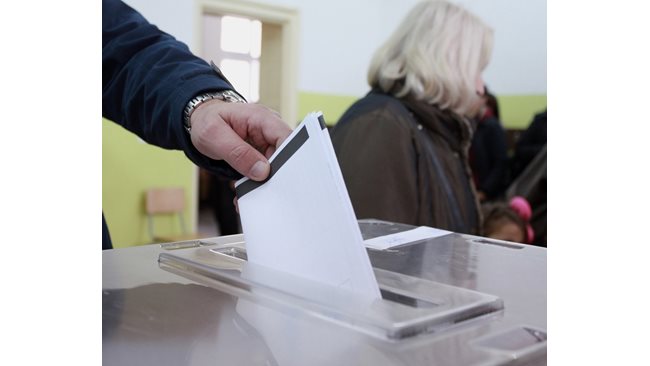The BSP submitted a proposal for her return – the machines repelled the red voters
Most likely, there will be a floating majority with GERB and MRF for the change in the Electoral code
Return of ballot papers as an alternative to machine voting. This is what the BSP is proposing with changes to the Electoral Code introduced in the National Assembly on Monday. And it is up to each voter to decide which of the two ways to use.
The BSP introduced the changes exactly two years after supporting the abolition of the paper bulletin and the introduction of machines.
However, this could create another rift in the ruling coalition, because GERB has also already announced that it will fight for the paper vote, while the mandate holders of “Change”, as well as “There are such people” and “Democratic Bulgaria” are firmly in favor of the machine.
There is no way for Slavi Trifonov’s party to support such a change, since it is its deputies
wrote a year ago the text with which the sections with over 300 voters passed by machine vote
The change in the Electoral Code was the only one adopted by the ill-fated 45th National Assembly, whose life in April 2021 lasted ten days. Then an anti-GERB majority was formed and the paper ballots were “torn” with the votes of ITN, BSP, DB and “Stand up!” Get out! ”
Thus, the vote for the 46th and the current 47th National Assembly in all major sections was entirely mechanical. The small ones kept the traditional ballots, while the others allowed them to be used only in unforeseen circumstances, which makes voting with a device impossible.
Democratic Bulgaria continues to oppose paper ballots and insists on the introduction of electronic (remote) voting.
The BSP’s proposal is unlikely to find support from “We continue the change”. The paper bulletin serves only corruption, MPs from the largest group are convinced and remind that the PP entered politics with a promise of zero corruption.
The Socialists already
have put the issue in coalition formats, but have met with strong opposition,
told acquaintances. The changes were introduced by the head of the Red Group Georgi Svilenski and his colleagues Filip Popov and Rumen Gechev.
The BSP’s intention to return the paper ballots was announced by leader Cornelia Ninova at the congress in January. In her report at the time, she said that the machines were important in the fight against the bought vote and the transparency of the elections, but they affected the BSP the most – leading to a large outflow of votes.
Machine voting overcame the hurdle with invalid ballots and falsifications of results. Limit controlled and purchased votes. This has made the last election much fairer and more transparent, but entirely machine voting
reduce turnout and we must be honest
and frankly. Many people greeted him with anxiety and did not go to the polls. This was confirmed both by opinion polls and by direct contact within the campaign. We, as a party and a parliamentary group, have fully supported machine voting, but perhaps it is time to make sense of its effect and consider introducing mixed, machine and paper voting with every citizen free to choose, Ninova said then.
The current amendments to the code aim to create equality in the right to vote, as well as to increase voter turnout, and hence the level of representation of institutions, their authors explain.
The three socialists propose that the results of the paper ballots and the machine vote be summed up and thus entered in the section protocol. The machine protocol will be attached to it, as it was in the last two parliamentary votes.
However, the dark rooms will not return,
in which ballots have been used so far, and the secret of the vote will be kept behind a screen.
According to the Reds, there will be no problem with the introduction of the old ballots, because under the same rules we voted only a year ago (for the 45th National Assembly), as well as the vote for the European Parliament in 2019 and the election administration easily cope.
This will not lead to additional costs, as bulletins are still being printed for each of the nearly 11,000 sections so that a vote can take place if there are problems with the machine.
The same formula – return of the paper and the possibility of a mixed vote of choice, GERB demanded last August. And this spring, the party said the change must be made urgently because new early elections are being called.
Before the National Assembly is dissolved, it must return the ballot paper voting. Then we can go to the polls, said yesterday in Ruse – a few hours before the Socialists submit the project, the head of the GERB group Desislava Atanasova.
The MRF is generally for machine counting of paper ballots
Last year, the party expressed fears that mixing paper and machine voting could make it difficult to report results. And in the parliamentary elections in April 2021, the entire leadership, led by Mustafa Karadayi, demonstratively released a paper ballot.
We from the MRF and from the rostrum of the National Assembly, and in media appearances categorically stood behind machine voting, but in what model? Machine counting of paper ballots. For us, whether it is machine or paper voting, it is not an end in itself, Karadayi said recently. Which does not exclude the possibility of the MRF to support the new life of the paper bulletin and thus put another sore spot for the government.
BSP with GERB and MRF have a total of 119 votes.
The position of Vazrazhdane is not clear yet, but Kostadin Kostadinov welcomed the changes in the Electoral Code a year ago, although he insisted that only the replacement of all local police chiefs would stop the vote trade.
–


